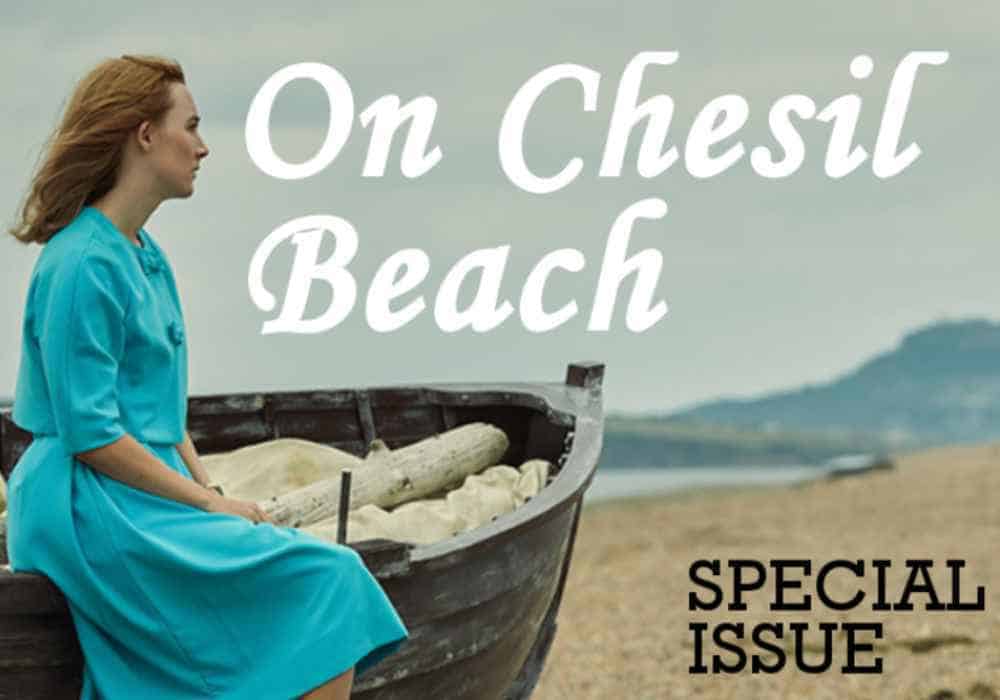To celebrate the release of On Chesil Beach, we are dedicating a week to interviews and essays on the film. Read the whole of our On Chesil Beach Special Issue here.

On Chesil Beach has been a Seventh Row favourite since Editor-in-Chief Alex Heeney and Associate Editor Orla Smith saw it on last year’s festival circuit. This divisive Ian McEwan adaptation may be flying under the radar with a quiet May release, but we want to raise its profile. Next week, we’ll be embarking on an eleven-piece Special Issue on the film — our largest, most comprehensive issue yet.
From June 4th to June 10th, we will publish new interviews and essays about On Chesil Beach every day. Our contributors examine the film’s blocking, its genre subversion, and the career of star Saoirse Ronan. We talk to director Dominic Cooke, whose brilliant production of Follies earned him rapturous acclaim last year. And we continue Seventh Row’s technical coverage in in-depth interviews with each department head, including DP Sean Bobbitt (12 Years a Slave, Shame), editor Nick Fenton, costume designer Keith Madden, and production designer Suzie Davies.
Together, these interconnected interviews provide invaluable insight into what each role contributes to the film, and the importance of collaboration. Our interview with costume designer Keith Madden will be available to everyone, but our remaining three tech interviews — all of which are vital companion pieces — are locked for Seventh Row members only. What’s more, members can get a jump on the issue right now by reading the first three pieces in our issue early: an excerpted interview with Cooke, an interview with screenwriter/novelist Ian McEwan, and an interview with star Billy Howle.
After sitting with On Chesil Beach for months and recently revisiting it, Alex and Orla have discussed it endlessly with each other. If we haven’t yet convinced you why you should delve deep into this film, let them tell you why our most ambitious Special Issue yet is worth your time.
Why we’re dedicating a Special Issue to On Chesil Beach
Alex Heeney (AH): The obvious reason is that I loved the film. But I was really interested in covering it because it was Dominic Cooke’s first feature film after years as a high profile London theatre director.
As someone with a film and theatre background, I’m really interested in how the two media are linked — so I knew I wanted to talk to Cooke about that. Then, I fell in love with the film at TIFF, especially its great blocking.
For me, it wasn’t an obvious “we must do a Special Issue” — at first. I wanted to interview Cooke at TIFF, and I got pulled into the press junket machine and ‘stuck’ with interviews with Ian McEwan and lead actor Billy Howle. But I got such rich material that it made me realise there were a lot of interesting things to explore with this film from a more technical side.
And then Orla and I saw the film again, and we both realised that it was really, really rich in detail, not just directorially or in the performances but in every aspect of production. And that made us want to dig deeper.
Orla Smith (OS): My initial interest was pretty much all to do with Saoirse Ronan. I didn’t come at it from the same theatre angle as you. So when people left the first TIFF screening saying it was just “meh”, I was ready to forget about the film… but you had really liked it so I decided to give it a chance!
It wasn’t at all what I expected. Everything pointed to ‘typical period romance’ — and even LFF marketed it as this heartbreaking, swoon-worthy romance. It was programmed as the gala screening in the festival’s ‘Love Strand’ and the brochure said: “Be warned — this film will break your heart.”
AH: Hold on — what? TIFF called it a comedy of sexual errors! It’s also pretty inaccurate — this is hardly a laugh-out-loud film — but maybe a bit more accurate than the soppy romance you were sold.
OH: Two opposite sides of the spectrum.
On Chesil Beach is not what you might expect from the marketing
AH: So clearly nobody knows how to market it, which is maybe exactly why it’s a 7R Special Issue film. Look at our history: experimental family drama (Louder Than Bombs), lesbian supernatural thriller that’s actually pretty naturalistic (Thelma), a surrealistic thriller about a fragile hitman (You Were Never Really Here), a movie named after a horse that’s not about the horse (Lean on Pete).
OS: And those are all films that subvert their particular genre in some way, which I think is why they’re difficult to market. A lot of the negative reactions around On Chesil Beach seem to centre around its failure as a sweeping romance. But it’s much more of an ideas film. It’s emotional, yes, but I was taken aback and delighted by how intellectually engaged I was in the story and in the ways in which it deconstructs its genre.
[click_to_tweet tweet=”‘Those are all films that subvert their particular genre in some way, which I think is why they’re difficult to market.'” quote=”‘Those are all films that subvert their particular genre in some way, which I think is why they’re difficult to market.'”]
A period piece that still resonates today
AH: On Chesil Beach is set in 1962, but things aren’t really that different. We’re a bit better at talking about sex, but there’s still a lot of taboo around it — at least in Canada and the U.K., and much more so in the US. It’s a film about these two people who have carved out a shared language for themselves, of music and birds and other things, but who have no language at all to discuss their problem — sex.
We’re not as naive as Florence and Edward were. We all usually work out the mechanics fairly young without a sex manual for married women – thank the movies, TV, etc. We know what they fundamentally don’t: that sex, like every skill, takes practice. But I think men and women are still pretty bad at talking about what they want and need, or even knowing what that is. Heterosexual norms and gender expectations are still baked in from centuries of patriarchy, and that makes sex complicated. We still posture about it.
Insights into collaboration in the filmmaking process
OS: These are themes that Ian McEwan — who adapted the screenplay from his own novel — often deals with in his writing. But the film isn’t great just because it’s based on great source material. I know you’re often frustrated by the critique that films adapted from plays or made by theatre directors are “too stagey”, and On Chesil Beach has inexplicably faced those same criticisms. Which is crazy to me because it’s so cinematic. The filmmaking choices — in blocking, framing, production design, costumes — are incredibly expressive and dynamic. Not only that, they add layer upon layer to McEwan’s ideas, meaning each viewing has brought new revelations.
AH: A common theme across all of our Special Issues, where we’ve interviewed department heads, has been the importance of collaboration. Cinematographers, production designers, editors, co-writers — all of them have emphasized what a great collaborator the director was and how that process worked. We saw this with Thelma back in the fall, but I think it became even clearer with our You Were Never Really Here and Lean on Pete issues because we were able to interview so many department heads. On Chesil Beach is our most comprehensive to date, including interviews with the lead actor, the novelist/screenwriter, and for the first time at 7R, an interview with the costume designer.
What’s so fascinating to me is just how much they all work together. When we get everyone’s perspective, we can really see how a film is made. Reading your interviews with production designers, for example, really lifted the curtain for me regarding what exactly they do and how they work with directors. It helped me to understand not just all the components that made this particular film great, but how to think about each of these areas of filmmaking more generally.
Even if you haven’t seen On Chesil Beach, never plan to see it, or saw it and didn’t like it, I still think there’s so much to learn from our eight interviews on the film. It’s like going to film school with all the experts in the field, all talking about how they worked together on one specific project to achieve a common goal.
Plus, I know there are a lot of fans out there of Dominic Cooke’s National Theatre production of Follies, which shares a lot of DNA with the film. The two were actually done back-to-back! He finished editing On Chesil Beach and then went straight into rehearsals on Follies, which premiered in London the day before On Chesil Beach screened in Toronto.
Before our biggest Special Issue yet begins, catch up on all of our previous issues. It all started with a love of Joachim Trier and a desire to give his overlooked masterpiece Louder Than Bombs its due. We’ve since done an issue on another Trier film, Thelma. Luca Guadagnino also has two issues dedicated to his films, one for A Bigger Splash and one for Call Me by Your Name. Last year, we also covered A Quiet Passion, Personal Shopper, and God’s Own Country. So far in 2018 we have dedicated issues to You Were Never Really Here and Lean on Pete. After On Chesil Beach we have issues on Unsane and Leave No Trace to look forward to this summer.

